Death is a constant possibility and a recurring visitor in our lives, as well as an eventual inevitability. So, what is our relationship with death? Is it something we dread and avoid, something we think about often? Is is true that death is never more than an arm-length away from us - do we carry our own death and the deaths of others around with us throughout our day-to-day lives? When we envision death, do we see it personified, a grim reaper, a skeleton?
We know that our existence will change when we die; and while no one really knows what that existence will be like, our understanding of that existence effects the way we live our lives and our relationship with death.
These are some of the thoughts that are brought to mind upon engaging with the subtle, yet powerful photography of 'Paper Lilies' photographer, Michele. Her work draws us in to a dreamlike, otherworldly reality that is at once ordinary and fantastic.
Michele has gracefully agreed to share her work, and some of her thoughts on art and death with The Daily Undertaker:
"death to me is very confusing, i don't understand it and i don't know what comes afterward, but i think that's somehow the sort of beauty in it. "
"nonetheless i think death is a very interesting topic, sometimes overlooked, ignored, feared."
"my photographs with the skeleton show a sort of desired connection to death - wanting to hold on to past loved ones, not wanting to move on."
"my fading portraits, however, show a very different aspect.i think we all feel like we are fading into the atmosphere a bit, like we aren't all here..or that we aren't seen. that we are fading into what could be death....an unnoticed or forgotten instance."
"my 'double exposures' are actually not double exposures at all, rather, they are just long exposures. i would have the shutter open for 30 seconds, run and sit where i was taking the photo for half of that time, then run and leave for the next, so you get this dream like, half-there-half-not effect."
"i think that yes, my images do have a correspondence to death in some ways,
my photographs have brought me closer to the subject of death. i think it has made me less afraid of it, and more curious."
my photographs have brought me closer to the subject of death. i think it has made me less afraid of it, and more curious."
For more of Michele's beautiful and engaging work, visit her Flickr site, Paper Lilies
For related posts, visit Art and Death
For related posts, visit Art and Death

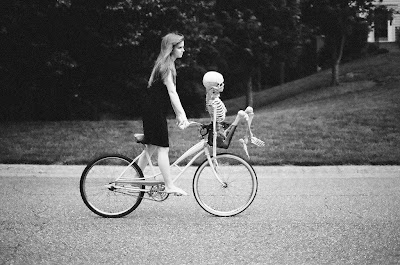





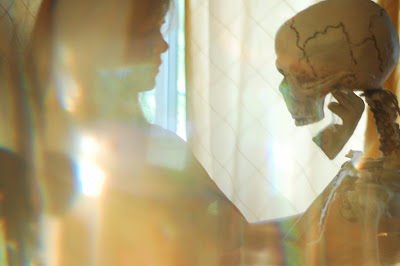
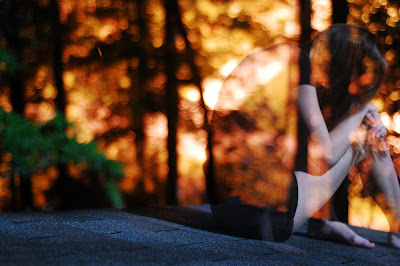
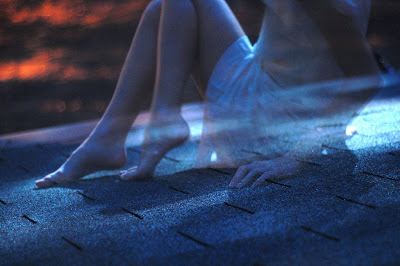
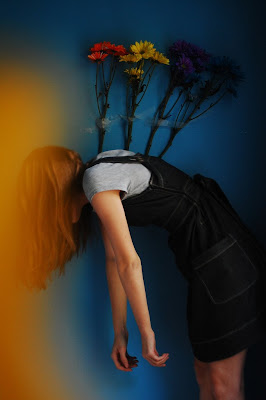


4 comments:
Thanks to Michele and Patrick."Our existence changes" when we die, muses Patrick. There are those of us who feel that it does not change, it simply ends, i.e. there is no other existence.
Is this frightening, neutral,a blessing? Michele says that in her beautiful long-exposure shots she is capturing the feeling she has of dissolving, fading. That's very interesting to me. Psychologist Dorothy Rowe regards the threat of the dissolution of our personalities, the fading away of our sense of self, to be a profounder fear than that of death, i.e. perhaps we would rather die than live without being our unique selves. Is there a seed for more of Michele's photos there?
Whatever we believe, I'm sure creative exploration of these powerful mysteries is "good for us.."!
Spellbinding, beautiful photos. Presence, absence... Shifting and altering identity... There is that in these photos which reminds us of the existential fear of photography exhibited by 'primitive' peoples. In place of fear, for us, wonderment.
May I just add that it is very well worth exploring Michele's Flicker photos. There is a real poetic vision and consistency here. Lone figure in a landscape or house, saying so much. She apologises for uploading too many photos. I beg to differ. Thank you.
Yes, fascinating images and uncommon for contemporary artists, though death was always a common theme for the most important artists. I mean, in the end all Christian art is about defeating death, isn't it?
But whether our existence transforms or ends, the change is enormous and merits more attention than most give it.
Also interesting how differently people can view the impending threat to the self - personally, when it must come, I hope to welcome it as a purification, as a return to essence - and not at all as a loss of any unique self.
This "unique self", this ego, is merely a product of external conditioning. In death, I am freed of that and what remains, if anything, can be truly called my unique self. Of course, it was there throughout, but after childhood lost underneath all the rubbish the world grafted onto me.
Death as liberation from falsity.
Of course, this is all speculative, on both sides.
But the believer, if he really is one, has the advantage that he need not fear death. He should be able to live more freely - barring abuse by religion's using the after-life for their blackmail.
Post a Comment